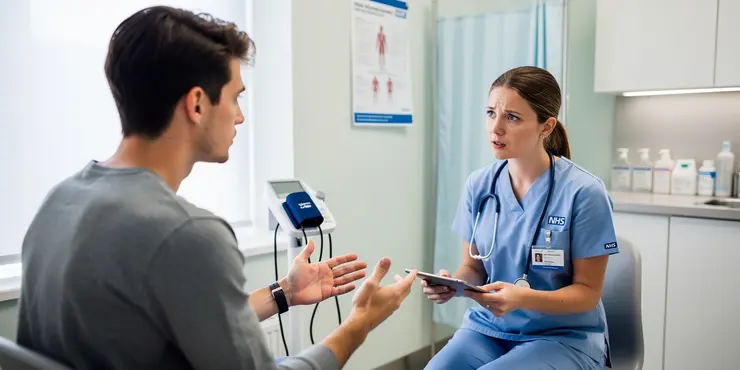
Find Help
More Items From Ergsy search
-
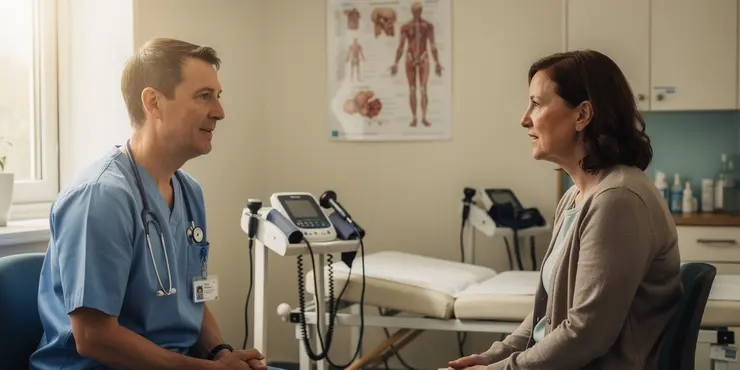
Is appendicitis hereditary?
Relevance: 100%
-
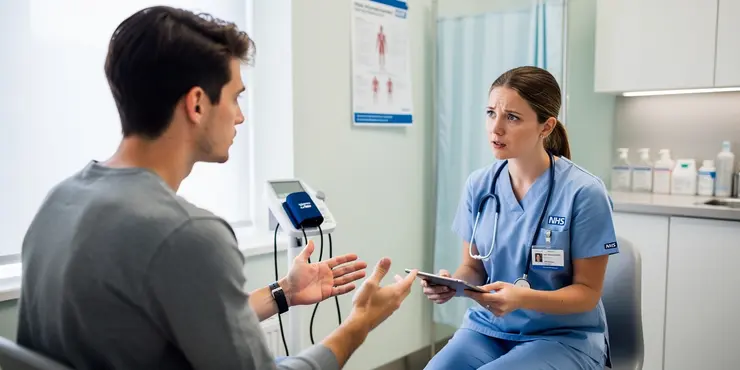
What is Appendicitis?
Relevance: 99%
-
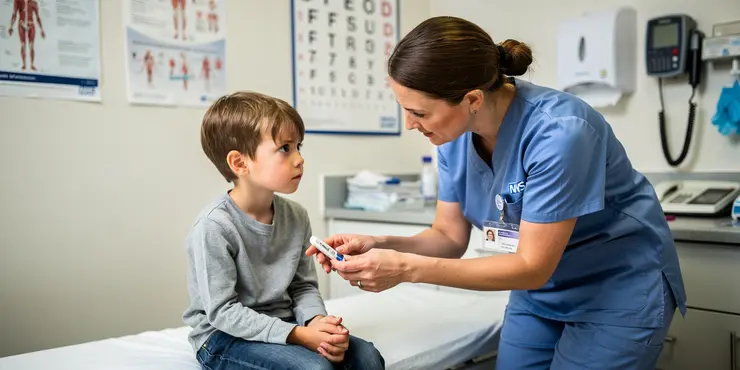
What causes appendicitis?
Relevance: 95%
-
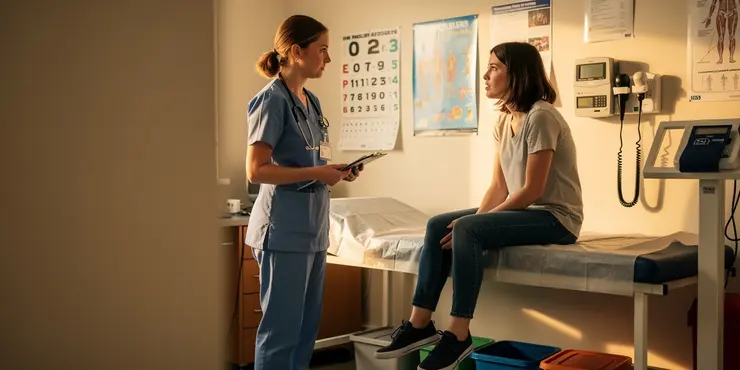
How is appendicitis diagnosed?
Relevance: 94%
-
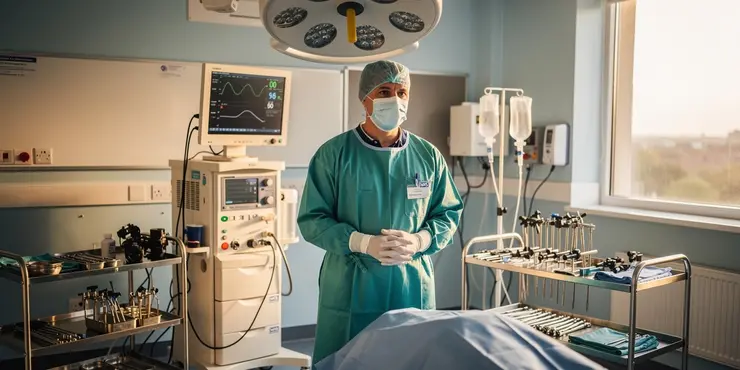
What is the treatment for appendicitis?
Relevance: 92%
-

Can appendicitis go away on its own?
Relevance: 91%
-
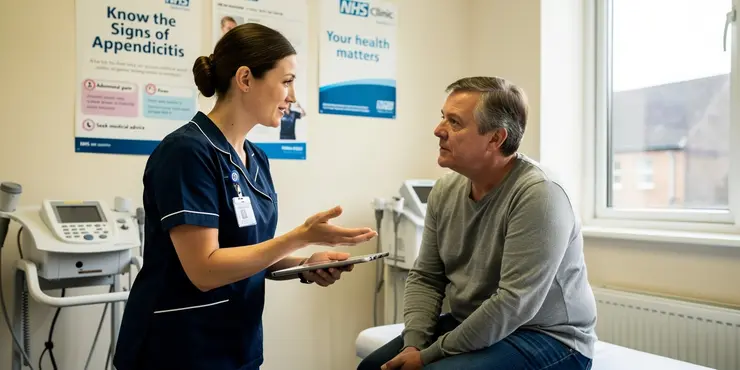
What are the common symptoms of appendicitis?
Relevance: 91%
-
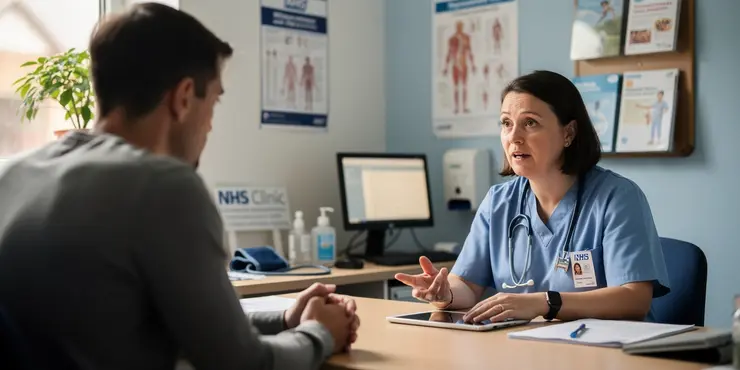
Can appendicitis be treated with antibiotics?
Relevance: 90%
-
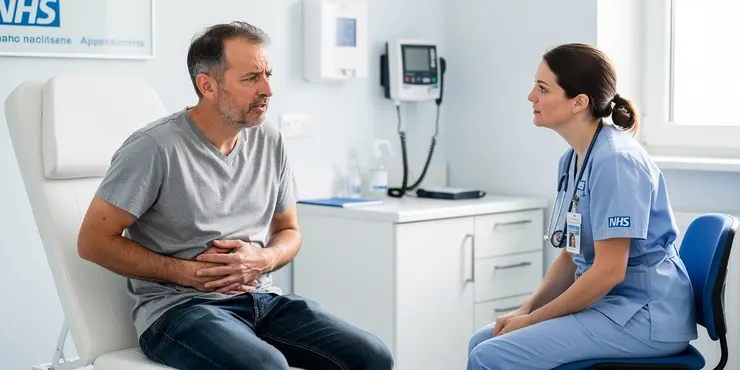
What are the potential complications of appendicitis?
Relevance: 89%
-
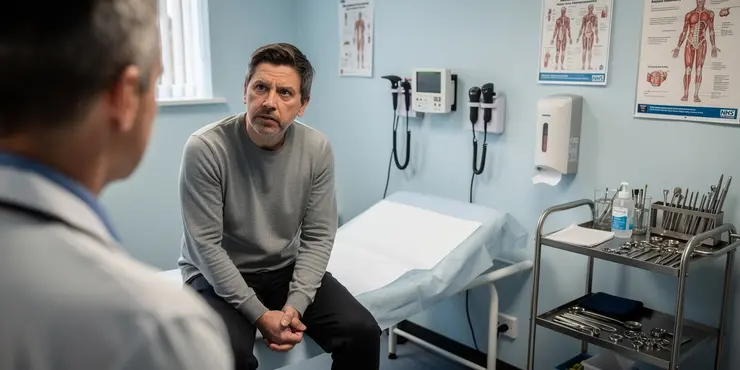
What happens if appendicitis is left untreated?
Relevance: 88%
-
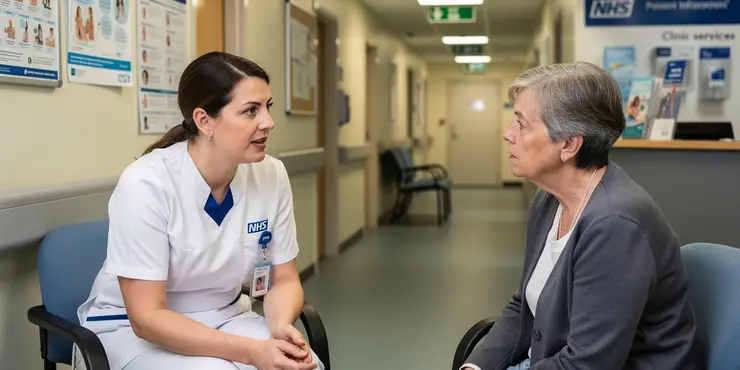
Can appendicitis occur more than once?
Relevance: 86%
-
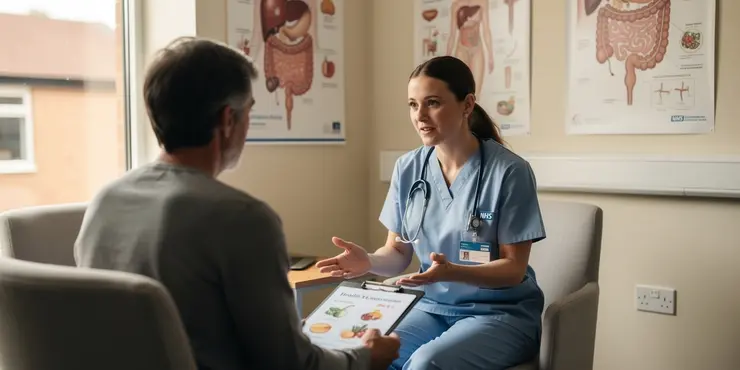
Can diet or lifestyle changes prevent appendicitis?
Relevance: 86%
-
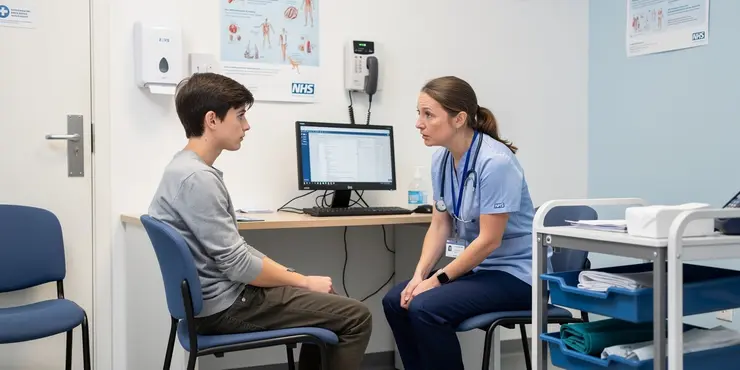
Is appendicitis common in any particular age group?
Relevance: 86%
-
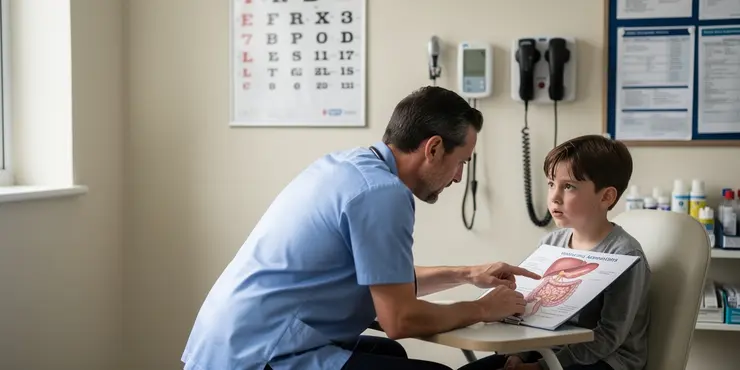
What is the likelihood of needing surgery for suspected appendicitis?
Relevance: 86%
-
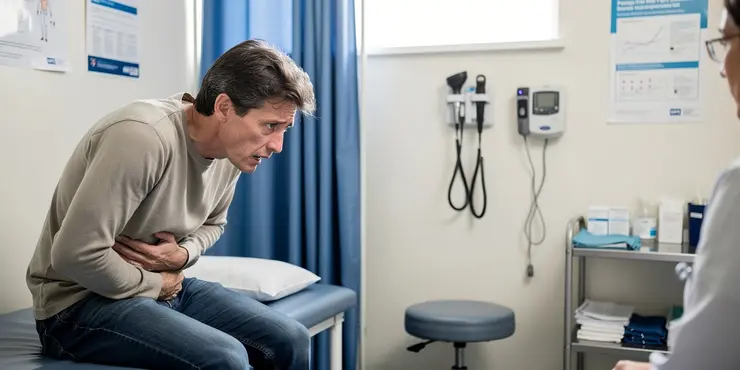
Where is the pain located when you have appendicitis?
Relevance: 83%
-
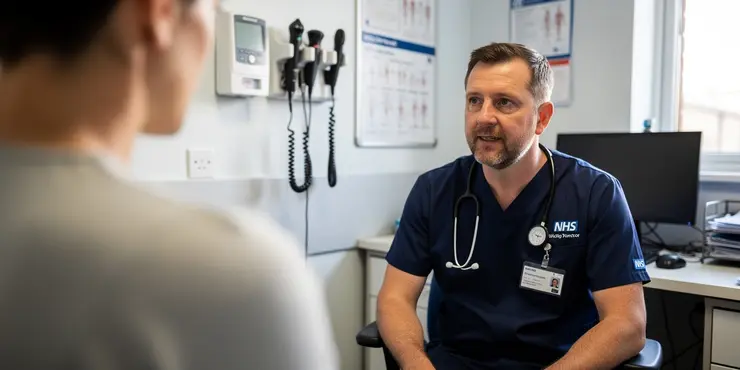
How is appendicitis different from other causes of abdominal pain?
Relevance: 82%
-
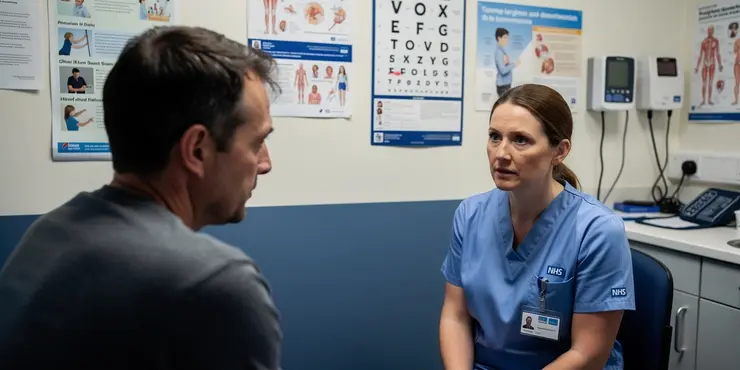
How soon should you see a doctor if you suspect appendicitis?
Relevance: 80%
-

Can you live without an appendix?
Relevance: 43%
-
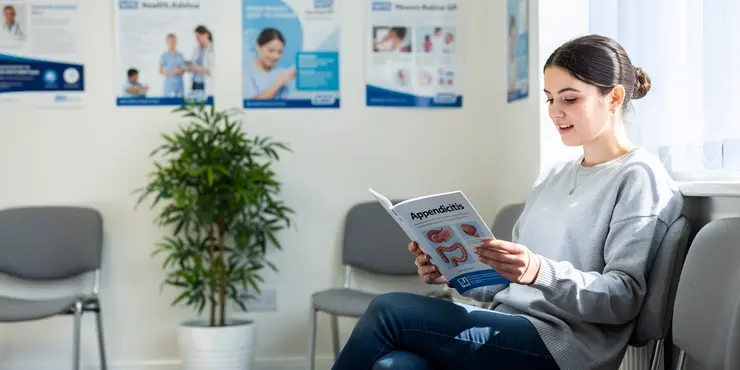
Are there any risk factors for appendicitis?
Relevance: 40%
-
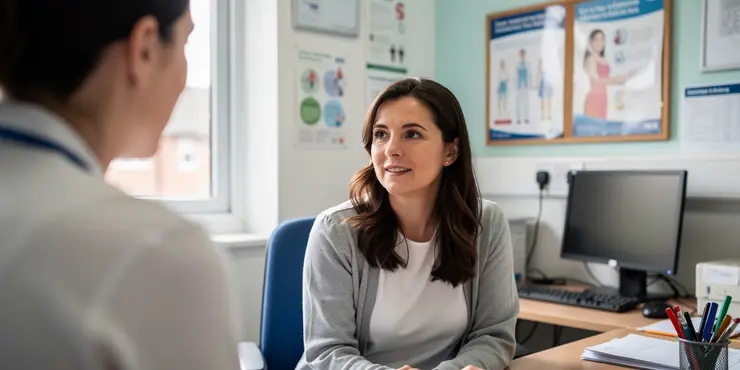
Stomach ache and abdominal pain
Relevance: 24%
-
How do I know if my surgery is considered elective or urgent?
Relevance: 13%
-

How long is the recovery time after an appendectomy?
Relevance: 13%
-
Is my healthcare provider obligated to correct errors in my medical records?
Relevance: 7%
-
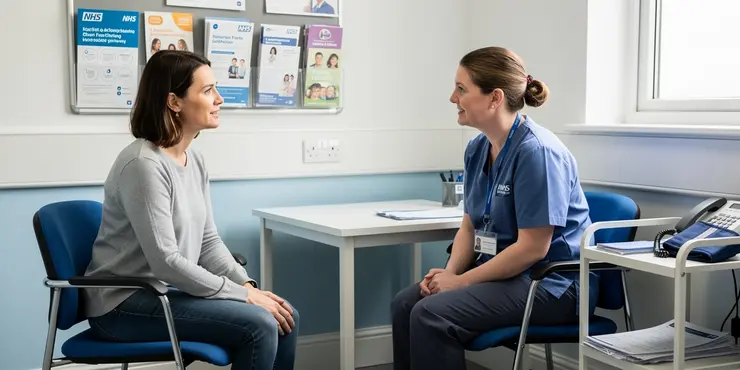
Understanding Your Sexual Health - Pelvic Inflammatory Disease
Relevance: 6%
What is Appendicitis?
Appendicitis is a medical condition characterized by the inflammation of the appendix, a small, tube-shaped pouch attached to the large intestine. Despite its seemingly insignificant role in the human body, the appendix can become a serious concern if it becomes inflamed or infected. Appendicitis often requires prompt medical treatment to prevent complications, such as a ruptured appendix, which can lead to a potentially life-threatening situation known as peritonitis.
Causes of Appendicitis
The exact cause of appendicitis is not always clear, but it typically occurs when the appendix becomes blocked by stool, a foreign body, or cancer. It can also be due to infection since the appendix can swell in response to any infection in the body. This blockage can increase pressure, impair blood flow, and trigger inflammation. Although appendicitis can occur at any age, it is most common in individuals between the ages of 10 and 30.
Symptoms of Appendicitis
One of the hallmark symptoms of appendicitis is abdominal pain, which generally starts near the navel and then shifts to the lower right abdomen. As the inflammation worsens, the pain typically increases and might become severe. Other common symptoms include loss of appetite, nausea, vomiting, constipation or diarrhoea, and a low-grade fever. If these symptoms manifest, it is important to seek medical care promptly.
Diagnosis and Treatment
Diagnosing appendicitis can be challenging due to symptom overlap with other conditions. A healthcare professional might conduct a physical examination, blood tests to check for signs of infection, and imaging tests such as an ultrasound or CT scan. If appendicitis is confirmed, treatment usually involves surgery to remove the appendix, known as an appendicectomy. This procedure can be performed as open surgery or through laparoscopy, which is less invasive and typically requires a shorter recovery time.
Recovery and Complications
Post-surgery, most patients recover without complications but might need to stay in the hospital for one to two days. Recovery usually involves resting and gradually resuming normal activities. Complications, although rare, can include wound infection or an abscess if not treated correctly. If the appendix bursts before removal, a longer hospital stay and more intensive treatment might be necessary.
Prevention and Outlook
There is no sure way to prevent appendicitis, but maintaining a diet high in fibre with plenty of fruits and vegetables may reduce the risk. Appendicitis is a common condition with a generally positive prognosis if treated promptly. Early diagnosis and treatment are key to preventing complications. If you experience symptoms indicative of appendicitis, it's essential to consult a healthcare provider immediately.
What is Appendicitis?
Appendicitis is when the appendix gets inflamed. The appendix is a small tube linked to the large intestine. Although it seems unimportant, an inflamed or infected appendix is serious. It needs medical care quickly. If not treated, it can burst and cause a dangerous condition called peritonitis.
Causes of Appendicitis
We don’t always know what causes appendicitis. It often happens when something blocks the appendix. This could be poop, a foreign object, or cancer. Infections can also make the appendix swell. The blockage can increase pressure and cause inflammation. People from 10 to 30 years old get it the most.
Symptoms of Appendicitis
The main sign of appendicitis is a sore tummy. It starts near the belly button and moves to the lower right side. The pain gets worse as the swelling increases. Other signs include not wanting to eat, feeling sick, throwing up, constipation or diarrhea, and a mild fever. If you feel these, see a doctor quickly.
Diagnosis and Treatment
Appendicitis can look like other problems, making it hard to spot. Doctors may check your tummy, do blood tests for infections, and take pictures, like an ultrasound or CT scan. If you have appendicitis, surgery usually removes the appendix. This is called an appendicectomy. It can be open surgery or laparoscopy, which is less painful and heals faster.
Recovery and Complications
After surgery, most people get better easily but might stay in the hospital for a day or two. Resting and slowly getting back to normal help recovery. Problems are rare but can happen, like the wound getting infected. If the appendix bursts, you may need to stay longer in the hospital and have more treatments.
Prevention and Outlook
You can't completely prevent appendicitis, but eating lots of fruits and vegetables might help. Appendicitis is common and usually gets better with quick treatment. Finding and treating it early stops problems. If you have symptoms, see a doctor right away.
Frequently Asked Questions
What is appendicitis?
Appendicitis is an inflammation of the appendix, a small, tube-like organ attached to the large intestine.
What causes appendicitis?
Appendicitis is usually caused by a blockage in the lining of the appendix, resulting in infection.
What are the common symptoms of appendicitis?
Common symptoms include abdominal pain, nausea, vomiting, loss of appetite, and fever.
Where is the pain located when you have appendicitis?
The pain is usually located in the lower right abdominal area, but it can start around the navel.
How is appendicitis diagnosed?
Appendicitis is diagnosed through a combination of physical examinations, blood tests, imaging tests such as ultrasound or CT scans.
Can appendicitis go away on its own?
Appendicitis usually requires surgical intervention and does not go away on its own.
What is the treatment for appendicitis?
The common treatment for appendicitis is an appendectomy, a surgical procedure to remove the appendix.
Can appendicitis be treated with antibiotics?
In some cases, antibiotics may be used to treat appendicitis, but surgery is the most definitive treatment.
Is appendicitis common in any particular age group?
Appendicitis is most common in people between the ages of 10 and 30, but it can occur at any age.
What happens if appendicitis is left untreated?
If left untreated, the appendix can burst, leading to a severe infection called peritonitis.
How long is the recovery time after an appendectomy?
Recovery time varies, but most people can return to normal activities within a few weeks after an appendectomy.
Can diet or lifestyle changes prevent appendicitis?
There is no certain way to prevent appendicitis, but eating a diet high in fiber may reduce the risk.
Is appendicitis hereditary?
There is no strong evidence to suggest that appendicitis is hereditary.
Can appendicitis occur more than once?
Once the appendix is removed, appendicitis cannot occur again.
What are the potential complications of appendicitis?
Complications may include a ruptured appendix, infection, or abscess formation.
How soon should you see a doctor if you suspect appendicitis?
You should seek medical attention immediately if you suspect you have appendicitis.
Are there any risk factors for appendicitis?
Risk factors may include age, family history, and diet, though the exact cause is often unknown.
How is appendicitis different from other causes of abdominal pain?
Appendicitis usually presents with a specific pattern of pain, starting near the navel and moving to the lower right abdomen, accompanied by specific symptoms.
Can you live without an appendix?
Yes, you can live a normal life without an appendix as it is not essential for survival.
What is the likelihood of needing surgery for suspected appendicitis?
Most cases of suspected appendicitis result in surgery, especially if there is a high suspicion of appendiceal inflammation.
What is appendicitis?
Appendicitis is when a small part inside your tummy called the appendix gets swollen and sore. It can make your tummy hurt a lot. If you feel this pain, tell a grown-up or a doctor.
To help understand better, you can look at pictures or watch videos about appendicitis. You can also ask someone to read this with you.
Appendicitis is when the appendix gets swollen and sore. The appendix is a tiny tube that is connected to the big belly intestine.
Why does the appendix get sore?
The appendix can get sore and swollen. This is called appendicitis. Here are some reasons why this might happen:
- The tube inside the appendix might get blocked. This can make it swell up.
- There could be an infection in the belly, and it spreads to the appendix.
- Sometimes, hard poop can block the appendix.
If you think you might have appendicitis, or if you have a sore tummy that won't go away, tell a grown-up or see a doctor.
Some helpful things to support you:
- Look at pictures of the body to understand where the appendix is.
- Talk to a nurse or doctor who can explain more about it.
- Use a simple app or tool online to learn more about the body.
Appendicitis happens when something blocks the appendix, and it gets infected.
What are the common signs of appendicitis?
Appendicitis is when a small part inside your belly gets sick.
Here are some signs that show you might have appendicitis:
- Your tummy hurts on the lower right side.
- You don't feel like eating.
- You feel sick or you might be throwing up.
- You have a fever, which means your body is too warm.
- Your tummy can look big and swollen.
If you think you or someone else has these signs, it's important to tell a grown-up or go to see a doctor. They can help make you feel better.
Looking at pictures in a book or using a video can also help you understand more about this.
Some common signs you might feel are tummy pain, feeling sick, being sick, not feeling hungry, and having a high temperature.
Where does it hurt when you have appendicitis?
Appendicitis is when your appendix is sick. If you have appendicitis, your tummy hurts. The pain is usually on the lower right side. This is near your hip.
If you feel pain there, it is important to tell a grown-up or see a doctor. They can help you feel better.
You can use pictures or a body map to show where it hurts. This can help you explain it better. Or you can write down how you feel.
The pain is often in the lower right side of your tummy. But sometimes, it starts near your belly button.
How do doctors find out if you have appendicitis?
Doctors find out if you have appendicitis by doing a few tests:
- They check your body with a physical exam.
- They take some of your blood to look at it with a blood test.
- They take pictures inside your body using an ultrasound or a CT scan.
Can your appendix stop hurting by itself?
If you have pain in your belly, it might be your appendix. Your appendix is a small part inside your body. Sometimes it can get sick. This is called appendicitis.
If you think you have appendicitis, it's important to see a doctor. Appendicitis usually does not go away by itself. A doctor can help you feel better.
Here are some things that can help:
- Ask a grown-up to take you to a doctor.
- Rest and try not to move too much until you see the doctor.
- Use a hot water bottle on your belly to feel a bit better.
- Tell someone if the pain gets worse.
Remember, it's always best to ask a doctor to check if you are not feeling well.
When your appendix gets sick, it's called appendicitis. You need a doctor to help fix it, and you usually need an operation. It won't get better by itself.
How is an appendix problem fixed?
If your appendix is causing pain, a doctor can help. Sometimes, the doctor will give you medicine to feel better. Other times, they might need to do a small operation to take out the appendix. This helps stop the pain.
It's important to tell a grown-up if your tummy hurts a lot. They can take you to see a doctor.
You can use picture charts or listen to a doctor explain to understand better. Sometimes, using easy words or drawings helps too.
The usual way to fix appendicitis is with surgery. The doctor takes out the appendix. This surgery is called an appendectomy.
Can medicine help if your appendix hurts?
If your appendix is sore, doctors might give you medicine called antibiotics.
Antibiotics are special medicines that help fight germs. They can make you feel better.
Sometimes, doctors need to do an operation to fix the problem.
Talk to your doctor to know what's best for you.
Using pictures, like a happy or sad face, can help you understand how you feel.
It can also help to write down your questions or have a friend with you when you talk to the doctor.
Sometimes, doctors give medicine called antibiotics to help with appendicitis. But usually, the best way to fix it is with an operation.
Who usually gets appendicitis?
Appendicitis is when your appendix gets big and hurts. It mostly happens to children and teenagers between 10 and 20 years old. But, anyone can get it.
To help understand, you can look at pictures of the body or use videos. Talking to a doctor can also help.
Appendicitis is most common in people who are 10 to 30 years old. But anyone can get it, no matter how old they are.
What happens if you do not treat appendicitis?
If the appendix is not treated, it can burst open. This can cause a bad infection in the belly called peritonitis.
How long to feel better after appendix surgery?
After appendix surgery, it usually takes about 1 to 3 weeks to feel better. Some people might need more time.
Take it easy and rest during this time. Ask a grown-up if you have questions or need help.
After you have your appendix taken out, it will take a little bit of time to feel better. Most people can go back to their normal activities in a few weeks.
Can eating or living differently stop appendicitis?
You can't completely stop appendicitis from happening. But eating foods with lots of fiber might help.
Can appendicitis run in families?
Appendicitis is when the appendix gets very sore or swollen. It can make your tummy hurt a lot.
Having an appendix problem does not usually run in families. This means if someone in your family has it, you might not get it too.
If you want to learn more about health and families, try talking to a doctor or use a speech-to-text app to help understand tough words.
We do not know for sure if appendicitis runs in families.
Can someone get appendicitis again?
When the appendix is taken out, you cannot get appendicitis again.
What problems can happen if your appendix is sick?
Problems can happen like a burst appendix, getting an infection, or a pocket of pus called an abscess.
When should you see a doctor if you think you have appendicitis?
If you think you have appendicitis, see a doctor right away. This means go as soon as you can.
Appendicitis is when a part of your body, called the appendix, gets sick.
You might feel pain in your belly, feel sick, or have a fever.
Ask someone you trust to help you get to a doctor. You can call for help or ask a grown-up to take you.
Visiting the doctor quickly is important to get the right help.
You can use a simple calendar to mark the day you first felt sick. This helps the doctor know more about what is wrong.
If you think you have a problem with your appendix, go to the doctor right away.
What can make someone more likely to get appendicitis?
Things that might make someone more likely to get sick are how old they are, illnesses in their family, and what they eat. Sometimes, we don't know why someone gets sick.
How is appendicitis different from other tummy aches?
Appendicitis is a special kind of tummy ache. Here is what makes it different:
- It usually starts as pain near the belly button and then moves to the lower right side of the belly.
- The pain gets worse with time.
- It can also make you feel sick, throw up, or have a fever.
If your tummy really hurts, it is important to tell a grown-up and see a doctor. They are the best people to help you.
Sometimes talking to someone or using a picture chart can help you explain how you feel to the doctor.
When you have appendicitis, your tummy can hurt in a certain way. First, it might hurt near your belly button. Then, the pain often moves to the lower right side of your tummy. You might feel other things too that can show you have appendicitis.
Can you live without an appendix?
The appendix is a small part inside your belly. Doctors can take it out if it gets sick.
You can still live and be healthy without your appendix. It is safe to remove it.
If you need help reading, try these tips:
- Ask someone to read with you.
- Use a ruler or your finger to follow the words.
- Take breaks if you need them.
Yes, you can live a normal life without your appendix. You do not need it to live.
How likely is it that you will need an operation for a sore appendix?
When doctors think someone might have appendicitis, they usually do surgery. This happens if they believe the appendix is swollen or inflamed.
Useful Links
This website offers general information and is not a substitute for professional advice.
Always seek guidance from qualified professionals.
If you have any medical concerns or need urgent help, contact a healthcare professional or emergency services immediately.
Some of this content was generated with AI assistance. We’ve done our best to keep it accurate, helpful, and human-friendly.
- Ergsy carfully checks the information in the videos we provide here.
- Videos shown by Youtube after a video has completed, have NOT been reviewed by ERGSY.
- To view, click the arrow in centre of video.
- Most of the videos you find here will have subtitles and/or closed captions available.
- You may need to turn these on, and choose your preferred language.
- Go to the video you'd like to watch.
- If closed captions (CC) are available, settings will be visible on the bottom right of the video player.
- To turn on Captions, click settings .
- To turn off Captions, click settings again.
More Items From Ergsy search
-

Is appendicitis hereditary?
Relevance: 100%
-

What is Appendicitis?
Relevance: 99%
-

What causes appendicitis?
Relevance: 95%
-

How is appendicitis diagnosed?
Relevance: 94%
-

What is the treatment for appendicitis?
Relevance: 92%
-

Can appendicitis go away on its own?
Relevance: 91%
-

What are the common symptoms of appendicitis?
Relevance: 91%
-

Can appendicitis be treated with antibiotics?
Relevance: 90%
-

What are the potential complications of appendicitis?
Relevance: 89%
-

What happens if appendicitis is left untreated?
Relevance: 88%
-

Can appendicitis occur more than once?
Relevance: 86%
-

Can diet or lifestyle changes prevent appendicitis?
Relevance: 86%
-

Is appendicitis common in any particular age group?
Relevance: 86%
-

What is the likelihood of needing surgery for suspected appendicitis?
Relevance: 86%
-

Where is the pain located when you have appendicitis?
Relevance: 83%
-

How is appendicitis different from other causes of abdominal pain?
Relevance: 82%
-

How soon should you see a doctor if you suspect appendicitis?
Relevance: 80%
-

Can you live without an appendix?
Relevance: 43%
-

Are there any risk factors for appendicitis?
Relevance: 40%
-

Stomach ache and abdominal pain
Relevance: 24%
-
How do I know if my surgery is considered elective or urgent?
Relevance: 13%
-

How long is the recovery time after an appendectomy?
Relevance: 13%
-
Is my healthcare provider obligated to correct errors in my medical records?
Relevance: 7%
-

Understanding Your Sexual Health - Pelvic Inflammatory Disease
Relevance: 6%


